Until last Friday, few Westerners had heard a thing about Tunisia yet the popular Jasmine Revolution, as some are calling it, has been brewing in Tunisia for years and outright battles which have left at least 70 Tunisian civilians dead have been taking place on its streets for the last three weeks.
The troubles started as a reaction to what Tunisians viewed as police culpability in the dramatic and very tragic suicide of 26-year-old Mohammed Bouazizi. He was very much a typical Tunisian youth, an educated graduate who was underemployed and selling vegetables in the local market in SidiBouzid to make ends meet. On December 17, the local police confiscated Bouazizi's produce, claiming he did not have a proper permit. In a frustrated response, the distraught vendor doused himself in gasoline and set himself alight in the street.
It wasn't just a fire though; it was a spark that drove Tunisians to their streets, igniting the fire of revolution. While Bouazizi languished in the hospital with third degree burns over his entire body, co-residents of the central Tunisian town of SidiBouzid took to the streets in support of the young man and also to protest what they saw as police obstructionism and government corruption, which has made the so-called Tunisian economic miracle somewhat less than miraculous for the average Tunisian, who is likely unemployed or employed and trying to support a family on an average salary of 300 USD per month in a country where the cost of food is comparable to Europe.
The protests in the town of SidiBouzid and the subsequent death of Mohammed Bouazzi garnered the attention and empathy of other Tunisians, magnifying the widespread frustrations that had been simmering in Tunisia for decades which include unemployment and what Tunisians consider rampant corruption of the Tunisian presidency.
But these issues are not new; Tunisia has been one of the most stable countries in the Arabic world for the past three decades. This stability has primarily come by the hand of a rather authoritarian leader, to put it politely. Zine El Abidine Ben Ali has ruled the country as President since 1987 and has repressed nearly all dissidence with stunning efficiency. He has without exception jailed oppositionists and outlawed anything that might look extremist to outside eyes, even beards on Muslim men. As recently as 2002, Ben Ali secured for himself the position of "President for Life", and obtained a special legislative protection against any possible future criminal proceedings through a special referendum in which the majority of the population supposedly agreed to his megalomaniacal wishes.
So what has changed? The new factor seems to be the emergence of the internet and social networking sites, which has both united Tunisians in a common cause -" freedom of information - and provided them with a vehicle for revolution. It has been widely accepted for years that Tunisian state-run media is not free. The new generation has largely ignored Tunisian television, which streams only tightly controlled information. Instead, they have flocked to their computers and accessed the rest of the world via the Internet. In recent years, however, the Ben Ali government had increasingly begun monitoring and censoring Internet activity, including attacks on some of the most beloved sites of Tunisian youth including YouTube, and social networking sites, such as Facebook. The censorship also extended to most foreign content.
In response, many Tunisian citizens became devout Internet freedom activists. Nhar 3la 3ammar, for example, is a Facebook page which describes itself as a "citizen's movement for a free internet" has more than 30,000 followers. Loosely translated, Nhar 3la 3ammar means "About Ammar," which refers to the Internet censor that Tunisian activists have nicknamed Ammar.
This homegrown online activism turned out to be an instrumental factor that propelled Tunisians to their streets and led to the subsequent ousting of Ben Ali.
While the December street protests in support of Mohammed Bouazizi gathered momentum, Tunisian cyber activists took to their computers to support their compatriots and document the events, effectively creating a competing and superior news source that reached thousands of Tunisians instantaneously via sites like Twitter and Facebook Mobile. Membership alone swelled by thousands in the last week and connected even more Tunisians through its twitter link http:/twitter.com/nhar3la3mmar.
Entering January, the government response intensified even further, making it almost absurd to continue describing events as protests or even riots. The streets of many cities in Tunisia now resembled battle zones; buildings were burning, stores had been looted and soldiers had been deployed in the suburbs around the namesake capital, Tunis. The death toll rose daily: on January 12 alone, thirteen Tunisian civilians were killed by police bullets and included a 15-year-old boy, a young mother of two and a deaf man who didn't respond to police warnings.
In light of the rising number of civilian deaths, the Tunisian activists' sites took on a new tone and focus, moving from Internet freedom to freedom from what they perceived to be government oppression and police violence. Tunisian flags dripping with blood replaced profile pictures and the word "revolution" has begun appearing on blogs and Facebook pages along with calls for the immediate removal of Ben Ali. Ordinary Tunisian Facebook members flocked to such sites, including the Facebook page, Revolution Tunisienne, swelling its following to well over 8000 as of this writing.
Tunisians used their computers to post almost minute by minute accounts of events as they unfolded: blurry images of street battles were uploaded from mobile phones and photos of the deceased to refute government claims that there were no civilian casualties. They also turned to Facebook, one of the few sites still operating in Tunisia, to access mainstream news from the outside world, which was blocked by censors.
As well as a news source, Tunisian activists used the internet to organize their uprising: information on protests were announced online as well as other activities to support the emerging revolution, such as blood drives in grocery store parking lots to help what the activists called the "martyrs of the revolution."
(Note: You can view every article as one long page if you sign up as an Advocate Member, or higher).






